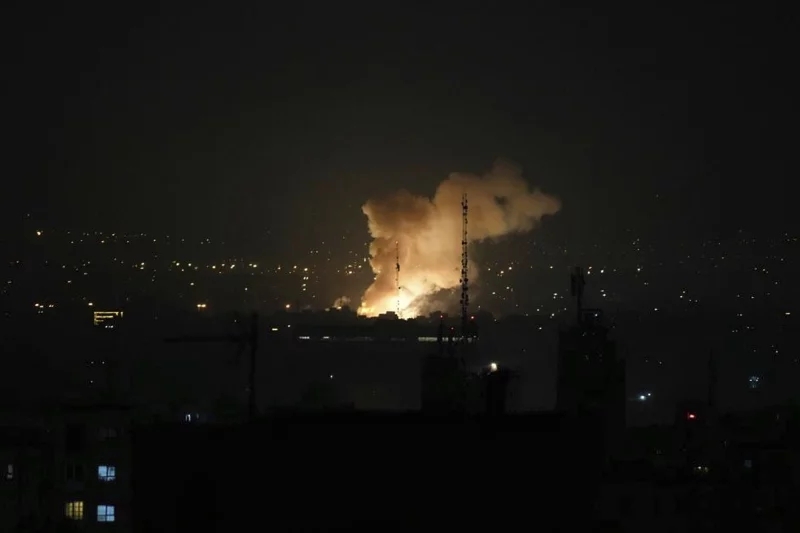Gambiaj.com – (BANJUL) – Israel launched a sweeping military campaign against Iran on Friday, striking dozens of nuclear and military sites and pushing the Middle East to the brink of wider conflict. With The Gambia currently holding the rotating chair of the Organisation of Islamic Cooperation (OIC), West African observers are closely watching Banjul’s next diplomatic move.
In a dramatic announcement, Israeli Prime Minister Benjamin Netanyahu said his country had initiated Operation Rising Lion, a targeted operation aimed at dismantling what Israel calls Iran’s growing capacity to develop nuclear weapons.
Among the targets were Iran’s uranium enrichment site at Natanz, missile factories, and the headquarters of Iran’s elite Revolutionary Guards.
Iranian state media reported the death of senior IRGC commander Hossein Salami and at least two nuclear scientists. Civilian casualties were also reported, including children in Tehran.
“We are amidst a historic campaign unlike any other,” declared Israeli military chief Eyal Zamir, as Tel Aviv braced for retaliatory strikes. Airports were shut, troops mobilized, and missile defenses placed on high alert.
Iran’s Supreme Leader Ayatollah Ali Khamenei vowed revenge, calling the strikes “a wicked and bloody crime” for which Israel would “receive a bitter fate.”
The Gambia’s Diplomatic Test
Iran and The Gambia restored diplomatic relations in July, last year, ending a 14-year hiatus. In 2010, The Gambia severed diplomatic and economic relations with Iran, ordering Iranian representatives to leave within 48 hours.
The decision was prompted by the impounding of heavy weapons from Iran for Gambian former dictator Yahya Jammeh.
The Gambia, with a strong record of Muslim solidarity and human rights advocacy, currently chairs the OIC — a 57-member bloc of Muslim-majority countries. Yet as of Friday evening, Gambian authorities had issued no public statement on the escalating crisis.
Will The Gambia condemn Israel’s attack in keeping with past OIC rhetoric on Israeli aggression? Or will it opt for cautious diplomacy, deferring to the broader consensus within the bloc?
A year ago, The Gambia played host to the OIC Summit in Banjul, where leaders reiterated support for Palestine and stressed peaceful nuclear development across member states. The country has consistently spoken against Israeli actions in Gaza, but this direct military confrontation with Iran marks a new test.
A senior Gambian foreign affairs official, speaking anonymously, said consultations were ongoing with other OIC members before any public statement would be made. “The situation is extremely volatile. As Chair, we are trying to ensure that our response reflects both the values and the unity of the OIC,” the official said.
U.S. Denies Involvement Amid Global Jitters
While some Israeli sources suggested quiet coordination with Washington, U.S. Secretary of State Marco Rubio said the United States was not involved in the strikes and urged Iran not to retaliate against American assets in the region.
“We are not involved in strikes against Iran. Our top priority is the safety of U.S. personnel,” Rubio stated.
Markets reacted swiftly to the unfolding crisis. Oil prices surged, and global investors fled to safe-haven assets, raising concerns about economic ripple effects for oil-importing African nations, including The Gambia.
Broader Implications for West Africa
The prospect of a broader Middle East war raises serious implications for West Africa — from economic shockwaves to increased pressure on diplomacy within the African Union and ECOWAS.
Already strained by domestic challenges, many governments may find themselves pulled into taking positions on a conflict with few easy sides.
Stocks dived in Asian trade on Friday, led by a selloff in Wall Street futures, while oil prices surged after Israel conducted a military strike on Iran, sending investors scurrying to safe havens such as gold and the Swiss franc.
The escalation in hostilities in the Middle East – a major oil-producing region – adds a fresh layer of uncertainty for financial markets at a time of heightened pressure on the global economy from U.S. President Donald Trump’s aggressive and erratic trade policies.
In the days ahead, The Gambia’s role as OIC Chair will face its most consequential test yet.
Will Banjul speak clearly — or cautiously — on one of the most dangerous escalations in recent Middle Eastern history?










